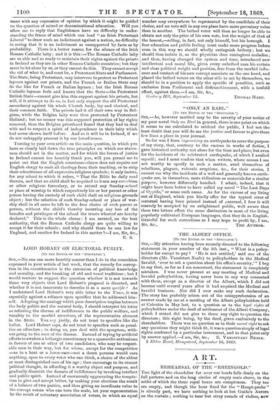LORD HOBART ON ELECTORAL PURITY.
[TO THE EDITOR OF THE "SPECTATOR."] SIR,—No one can more heartily concur than I do in the conculsion expressed in your article of last week, that the remedy for corrup- tion in the constituencies is the extension of political knowledge and morality, and the breaking of old and venal traditions ; but I would venture to suggest the question whether it is not towards these very objects that Lord Hobart's proposal is directed, and whether it is not inaccurate to describe it as a mere specific ? As I understood Lord Ilobart's very able letter to the Times, it was especially against a reliance upon specifics that he addressed him- self. Adopting the analogy which your description implies between the body politic and the natural body, I should interpret his letter as referring the disease of indifference to the public welfare, and venality to the morbid structure, of the representative element in the State. You say justly, do not trust to specifics like the ballot. Lord Hobart says, do not trust to specifics such as penal- ties on offenders ; in doing so, you deal with the symptom, with- out going to the root of the disease. Instead of trying by artificial efforts to awaken a lethargic constituency to a spasmodic enthusiasm in favour of one or other of two candidates, who may be respect- able men in their way, but for whom, except for the competition —as in a boat or a horse-race—not a dozen persona would care anything, open to every voter who can think, a choice of the ablest or most distinguished men of his age ; then encourage to its utmost political thought, in affording it a worthy object and purpose, and gradually diminish the domain of indifference by invoking intellect and public spirit. Instead of enormously aggravating the tempta- tion to give and accept bribes, by making your elections the result of a balance of two parties, and thus giving an inordinate value to the corrupt voters who can turn the scale, let your representation be the result of voluntary association of voters, in which an equal
number may everywhere be represented by the candidate of their choice, and no vote will in any one place have more pecuniary value than in another. The bribed voter will then no longer be able to obtain not only the price of his own vote, but the weight of that of the honest,—selling, in fact, not only himself, but his borough. I fear education and public feeling must make more progress before even in this way we should wholly extinguish bribery ; but we should thus isolate it, as the physician does contagious maladies ; and then, having changed the system and tone, introduced new intellectual and moral life, given every unbribed man his certain and clear political weight and position, free from the morbid influ- ence and contact of his now corrupt associate on the one hand, and placed the bribed voters on the other side to act by themselves, we should be in a position to apply the specific of penalties, such as exclusion from Parliament and disfranchisement, with a tenfold effect, against them.—I am, Sir, &c.,
Gus/no y Hill, September 12. THOMAS HARE.






























 Previous page
Previous page